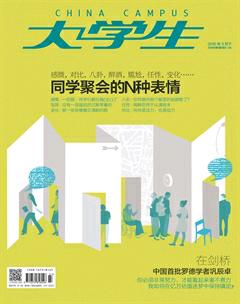巩辰卓申请罗德奖学金时的个人陈述
The night when I left for UNESCO Dar es Salaam, my grandfather came to bid farewell. He did not urge me to keep safe as I anticipated. Instead, he said to me, in an unusually serious tone, “Go flying your dreams.”
Looking back into my college years, I have made innumerable choices on my own. But a decision I would never feel regretful is to become a volunteer teacher for five vacations. Though the experience only composes two lines on my three-page CV, it has defined who I am.
In February 2015, I was surprised to receive a special phone call while taking my quantitative training in Brazil. It was from one of my students in the Boxue County, a small village in Chinas Hainan Province. He dialed my number using his moms mobile phone: he did not say I miss you; instead he just asked me, in the purest tone of a child, “Will you come back next year”. My eyes turned moist in a flash.
It was the first winter vacation in my college years that I did not go to Boxue County as a volunteer teacher. Before that, I was there for three consecutive vacations. I love those kids and they are waiting for me as well. It is maybe my love to those kids that has planted the seed of NGO dream in my heart. My long-term career objective is to create an NGO that empowers the rural students and other marginalized groups in my late thirties.
After my graduation, I intend to stay in the private sphere for about five years, then jump to the Bill & Melinda Gates Foundation to get prepared for my NGO dream.
If my story ends here, it would miss a critical aspect: my academic aspiration. It may be tempting to frame my research under the grand narrative of my NGO dream; but from its very outset, my queries in social media diplomacy have been purely academic.
Social media diplomacy is the marriage of two emerging fields: social media and public diplomacy. Just like any curious researcher, I was instantly mesmerized by this unchartered territory. It comes with a price to opt for the road less traveled by other scholars. I have few existing literatures to draw from. And the interdisciplinary nature of my research drove me to consult with three professors at the same time: one for quantitative methods, one for Internet insights, and one for public diplomacy. Still, I often felt like a lone expeditor. Therefore, the moment when I came across the MSc in Social Science and the Internet, I was literally shaking out of sheer excitement. I knew it is the place for me. Apart from the advanced statistic course, what intrigues me most is the course Accessing Research Data from the Social Web in the Hilary term. I am now using third-party software like Nvivo to extract my raw data. If I can master Python, the quality of my database would be greatly improved.
Though driven by my academic curiosity, I hold faith in the interconnected nature of knowledge. Just as Steve Jobs Calligraphy interests inadvertently effected the typography revolution in the computer world, my seemingly unrelated experiences in academic research, I believe, will come back to me one day when I start my NGO. Indeed in my mind, founding an NGO is the hard mode of doing research; they share the characteristic of solving concrete problems, but real-world problems are way more complex.
Look forward to sharing more in the interview, and wish to see you in Beijing and Oxford.

